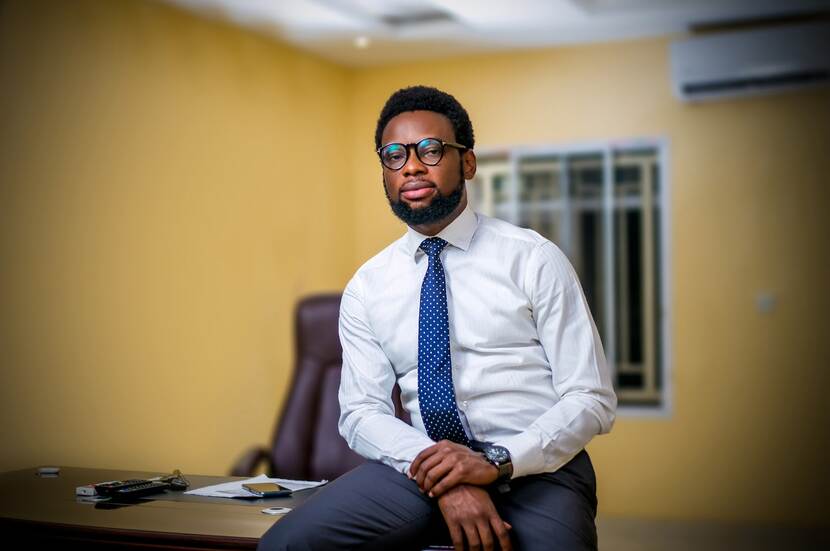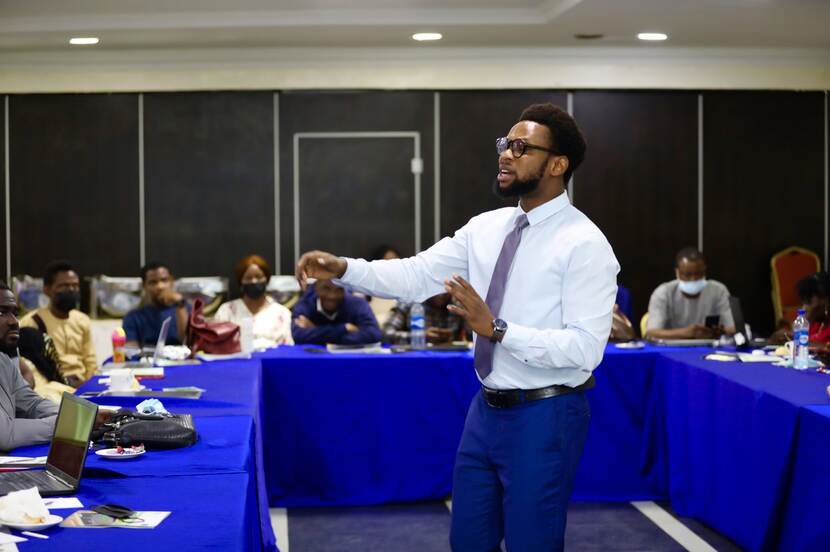‘People who were wrongfully imprisoned have been freed thanks to our stories’
His Foundation for Investigative Journalism (FIJ) exposes abuses in Nigeria. And he has won international awards for his efforts. But ’Fisayo Soyombo’s work comes at a price. ‘I’ve had to promise my parents I’ll be careful about my personal safety when I publish a high-profile report.’

The Netherlands works around the world to support the freedom of the press and enhance the safety of journalists like ’Fisayo. For instance, the Ministry of Foreign Affairs is one of the partners of Shelter City, an initiative that offers temporary reception, training and security to international human rights defenders (such as journalists, community leaders, lawyers, artists and academics) who are working to combat human rights violations in their countries. The Ministry also supports the World Press Freedom Conference.
Is it fair to say your journalism is quite activistic?
‘Absolutely. But make no mistake. Quality journalism is my top priority. The stories we publish through the Foundation for Investigative Journalism meet the highest journalistic standards in terms of objectivity and the pursuit of truth. Otherwise I wouldn't have won any international press awards.’
‘But you can certainly call our work activistic. We make a conscious effort to expose corruption and abuses of power so that the Nigerian people can see the injustices that are taking place. And so that they can hopefully hold the government to account, and bring about change in this country.’
Which of the stories published by your organisation are you most proud of?
‘We founded the organisation in November 2020, and started publishing in January. In the past five months we have reported on a police inspector who raped a woman and whose friends in the police force protected him. We also uncovered the story of a businessman who fired an employee for refusing to have sex with him.’
‘Thanks to our stories, several corrupt police officers have been fired and the inspector has been charged with rape. And other stories have led to the release of five people who had been wrongly imprisoned, for instance because they had refused to pay bribes.’
You've won several awards as an investigative journalist. Including a Dutch award in 2016 from Free Press Unlimited: ‘Newcomer of the Year - Hans Verploeg Award’. How important is this recognition?
‘It's always an honour and a boost to your ego when your work is acknowledged and receives recognition. But these kinds of awards are particularly important to journalists who work under the most difficult conditions. If your work receives wider publicity, more attention is focused on the abuses you’re reporting on. This can help ensure that something is finally done about these issues.’
‘You also might be a little less vulnerable as a journalist if you’re known internationally. You'd hope at least that it would deter people from trying to harm you.’
In 2016 you collected your award in The Hague. Last week you visited The Hague again – virtually this time, for the International Legal Order programme. What kind of event was this?
‘This online programme was organised by the Netherlands Enterprise Agency (RVO.nl), on behalf of the Dutch Ministry of Foreign Affairs and at the request of the Dutch embassies in Dakar (in Senegal) and Accra (in Ghana).’
‘The aim was to enable 15 Anglophone and 15 Francophone journalists from African countries to get to know the UN organisations that contribute to the international legal order. In The Hague, the world’s city of peace and justice, those organisations are the International Court of Justice (ICJ) and the International Criminal Court (ICC).’
What did the programme consist of and how will it help you in your work?
‘The journalists all took part in three morning sessions with experts on the structure, working methods and mandate of the ICJ and the ICC. For instance, we were able to speak with a former ICJ judge and an ICC spokesperson.’
‘A deeper knowledge of these UN organisations will help me assess the corruption in Nigeria, as well as war crimes committed by government troops and Boko Haram fighters, in terms of the internationally agreed norms. So it puts me in a better position to comment on them.’
You’ve reported on corruption within government and the business community. That can’t have made you many friends. What are the consequences for you?
‘I have supporters, and I also have opponents who hate me. I’ve heard from sources that in 2019 I was possibly going to be arrested after my undercover investigation on the police and the prison system. But thanks to online shows of support (#KeepFisayoSafe) they didn’t dare go through with it. For that story I purposely got myself arrested and spent five days at the police station and eight days in prison to show how corrupt our criminal justice system is.’
‘These days I look after my own security by always taking a number of specific measures, which I can't share with you of course.’

Do you parents worry about the consequences of your work?
‘I’ve had to agree with my parents that I’ll be as careful about my security as I can whenever a high-profile report is published. I had to make that promise after they heard on the news about my undercover investigation on the police and the prison system.’
‘They didn’t know I was working on that – I never tell them what I’m working on – and out of the blue they heard about this story and the fact that I was wanted by the authorities. The support me through thick and thin, but they worry too.’
Can you count on support from your fellow journalists in Nigeria?
‘I wish the answer was “yes”, but unfortunately the situation in Nigeria gives cause for concern. Government officials and businesspeople often pay corrupt journalists to not publish a story, or to publish the version they want. The support I receive from colleagues varies greatly. Some support me through thick and thin. Others think I’m rather troublesome.’
‘And journalists in this country can’t rely on the two biggest press associations either: the Nigeria Union of Journalists (NUJ) and the Nigerian Guild of Editors (NGE). They never respond to journalists’ requests for help if they are being threatened or if the authorities are making it impossible for them to do their work.’
How do you stay motivated to keep doing this work?
‘That’s not hard for me at all. Despite the conditions I work in and the personal risks, I’m really living my dream. I wasn’t even trained as a journalist. I spent seven years studying animal science at two universities. I should be running a cattle farm now. But what am I doing instead? Going undercover in prisons and psychiatric hospitals. Looking for abuses in the system so that my small contribution can help foster change. I wouldn’t want it any other way.’